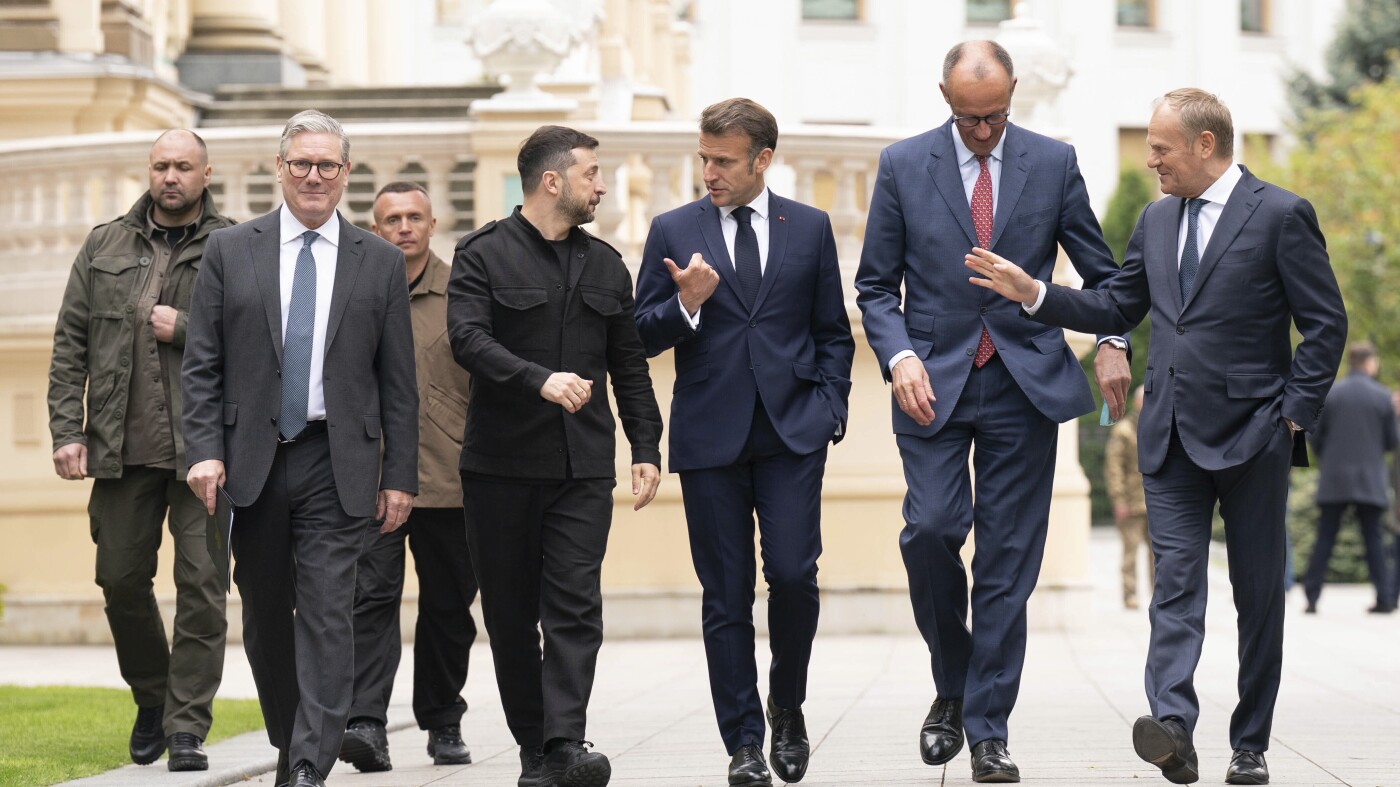The Push for a 30-Day Ceasefire
In the intricate tapestry of global politics, a new thread of hope is being woven as Ukraine and its allies advocate for a 30-day ceasefire with Russia. This initiative, set to begin on Monday, is more than just a pause in hostilities; it is a strategic move to create a window for meaningful peace talks and potentially end the protracted conflict that has ravaged Ukraine for nearly three years.
Diplomatic Efforts and International Support
The geopolitical stage is set with intense diplomatic efforts, as leaders from France, the United Kingdom, Germany, and Poland converge in Kyiv. This united front, bolstered by the support of the United States, marks a significant milestone. It is the first time these leaders have traveled together to Ukraine, signaling a collective stance that is both powerful and unprecedented. The European leaders, alongside the U.S., are urging Russia to agree to a full and unconditional 30-day ceasefire. This ceasefire is seen as a crucial step towards fostering an environment conducive to peace talks.
The diplomatic push is not just about stopping the fighting; it is about creating a space where diplomacy can thrive. The leaders from these key nations are calling on Russia to agree to this ceasefire to facilitate discussions on a just and lasting peace. This initiative is part of a broader effort to pressure Russia into negotiating an end to the conflict, with the possibility of joint sanctions if Moscow refuses to comply.
Ukraine’s Resolute Stance
Ukrainian President Volodymyr Zelenskyy has been vocal about his country’s stance, emphasizing that Ukraine has not sought a single moment of this war. His call for an immediate and unconditional ceasefire resonates with the sentiment that Ukraine values human lives over parades. This message is echoed by Ukrainian presidential aide Andrii Yermak, who met with the European leaders and underscored the need for a just peace. The Ukrainian Foreign Minister Andrii Sybiha has also reiterated the country’s readiness for a full, unconditional ceasefire.
Ukraine’s position is clear: the conflict must end, and it must end now. The country has suffered immensely, and the push for a ceasefire is a testament to its resilience and determination to seek peace. The international community’s support is crucial in this endeavor, as it provides the necessary pressure on Russia to agree to a truce.
Russian Response and Skepticism
The Russian response, however, has been met with skepticism. Ukrainian officials have accused Russia of violating its own three-day ceasefire, which was announced to mark the 80th anniversary of the victory in World War II. Kyiv has labeled this ceasefire as a “farce,” suggesting that it is a ruse to create the impression that Russia is willing to end the war. Despite these accusations, the push for a 30-day ceasefire continues, with Ukraine and its allies hoping to pressure Russia into agreeing to a truce.
The Russian actions have raised questions about their commitment to peace. The violations of the three-day ceasefire have further eroded trust and made the push for a 30-day ceasefire even more critical. The international community is watching closely, hoping that this diplomatic effort will lead to a lasting resolution to the conflict.
The Proposed Ceasefire and Its Implications
The proposed 30-day ceasefire is a strategic move to create space for peace talks. The leaders from France, the United Kingdom, Germany, and Poland, along with the U.S., are calling on Russia to agree to this ceasefire to facilitate discussions on a just and lasting peace. This initiative is part of a broader effort to pressure Russia into negotiating an end to the conflict, with the possibility of joint sanctions if Moscow refuses to comply.
The ceasefire proposal comes at a critical juncture, as Russia continues its attacks along the front line, including deadly strikes on residential areas. The humanitarian cost of the conflict is immense, and the ceasefire is seen as a necessary step to alleviate the suffering of civilians and create an environment where diplomatic efforts can bear fruit. The push for a ceasefire is not just about stopping the fighting; it is about creating a space where diplomacy can thrive and a just peace can be achieved.
The Path Forward
The push for a 30-day ceasefire is a complex diplomatic maneuver that involves multiple stakeholders. The success of this initiative hinges on Russia’s willingness to engage in meaningful negotiations and adhere to the terms of the ceasefire. The international community’s support, including the U.S. and key European nations, is crucial in exerting pressure on Russia to agree to a truce.
The ceasefire proposal is more than just a temporary halt to hostilities; it is a test of Russia’s commitment to peace. If Russia agrees to the ceasefire, it could pave the way for sustained peace talks and potentially end the conflict. However, if Russia continues to violate ceasefires and engage in hostilities, it will further isolate the country on the global stage and potentially face increased sanctions.
Conclusion: A Crucial Moment for Peace
The push for a 30-day ceasefire starting on Monday is a pivotal moment in the ongoing conflict between Ukraine and Russia. The collective efforts of Ukraine and its allies, backed by the international community, represent a significant push towards ending the war and achieving a just and lasting peace. The success of this initiative will depend on Russia’s willingness to engage in meaningful negotiations and adhere to the terms of the ceasefire. The world watches with bated breath, hoping that this diplomatic effort will lead to a lasting resolution to the conflict. The fate of millions hangs in the balance, and the actions taken in the coming days could shape the future of Ukraine and the broader geopolitical landscape. This is a crucial moment for peace, and the world is watching to see if diplomacy can prevail over conflict.

